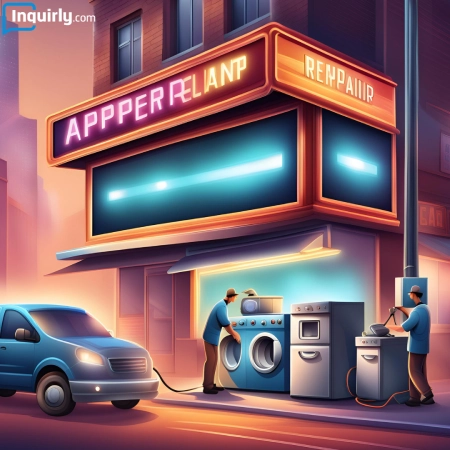Running an appliance repair business means you’re used to fixing everything from malfunctioning refrigerators to broken washing machines. But what happens when your business faces unexpected challenges?
That’s where having the right insurance comes into play. In this post, we’ll explore the types of insurance your appliance repair business needs, why they’re essential and how to secure proper coverage.
What is Appliance Repair Business Insurance?

Appliance repair business insurance is a set of policies designed to protect your company from financial losses due to accidents, property damage, lawsuits and other risks specific to your industry. It’s different from general business insurance because it takes into account the unique challenges faced by appliance repair professionals.
Why Do You Need It?
You might be thinking, “I’m careful in my work. Do I really need insurance?” The answer is a resounding yes! Here’s why:
- Financial Protection: Even the most skilled technicians can make mistakes. Insurance protects you from potentially bankrupt lawsuits or repair costs.
- Legal Requirements: Depending on your location, certain types of insurance may be mandatory for operating your business legally.
- Customer Trust: Clients feel more confident hiring an insured business, knowing they’re protected if something goes wrong.
- Securing Contracts: Many large clients or property management companies require their contractors to have insurance.
For more insights on business insurance in related industries, check out our post on Types and Costs of Roofing Business Insurance in 2024.
Types of Insurance for Appliance Repair Businesses
1. General Liability Insurance
This is the foundation of your insurance package. It covers property damage and bodily injury that might occur during your work. For example, if you accidentally damage a customer’s flooring while moving a refrigerator, this insurance would cover the repair costs.
According to a recent industry report, general liability insurance for small businesses typically costs between $400 and $600 per year.
2. Professional Liability Insurance (Errors and Omissions)
This policy protects you if a client claims your work caused them financial loss due to mistakes or negligence. For instance, if a faulty repair leads to food spoilage in a restaurant’s refrigerator, this insurance would cover the associated costs.
3. Commercial Property Insurance
If you have a physical location for your business, this insurance protects your building, equipment and inventory from events like fire, theft or natural disasters.
4. Workers’ Compensation Insurance
If you have employees, this insurance is typically required by law. It covers medical expenses and lost wages if an employee is injured on the job.
5. Commercial Auto Insurance
This covers vehicles used for business purposes. It’s essential if you or your employees drive to job sites.
6. Tool and Equipment Insurance
This specialized coverage protects your valuable tools and diagnostic equipment from theft or damage.
For a deeper dive into insurance costs for service businesses, take a look at our article on How Much Does HVAC Business Insurance Cost?
How Much Does It Cost?

The cost of insurance varies widely based on factors like your business size, location and claims history. However, for a small appliance repair business, you might expect to pay:
- General Liability: $500 to $1,500 per year
- Professional Liability: $500 to $1,000 per year
- Commercial Property: Varies greatly, but can start around $500 per year
- Workers’ Compensation: Typically $1 to $1.50 per $100 of payroll
- Commercial Auto: $1,000 to $2,000 per vehicle per year
- Tool and Equipment: Often bundled with property insurance, but can add $300 to $600 per year
To get accurate quotes, use online comparison tools like CoverWallet or Simply Business.
Choosing the Right Provider
When selecting an insurance provider, consider:
- Reputation: Look for companies with strong financial ratings from agencies like A.M. Best.
- Industry Experience: Choose insurers familiar with the appliance repair industry.
- Customer Service: Read reviews and check their claims process.
Some reputable providers for small businesses include The Hartford, Progressive Commercial and Hiscox.
Steps to Get Insured
- Assess your needs: Consider your business size, services offered and potential risks.
- Gather information: You’ll need details about your revenue, employees and services.
- Get quotes: Contact multiple providers or use an online comparison tool.
- Review policies: Pay attention to coverage limits, deductibles and exclusions.
- Consult an agent: They can help you understand complex policy details.
- Purchase and set up payments: Many insurers offer monthly payment plans.
Best Practices for Appliance Repair Businesses
To minimize risks and potentially lower your insurance costs:
- Implement and document safety protocols
- Train employees regularly on safety and best practices
- Keep detailed records of all jobs and client interactions
- Review and update your coverage annually
FAQs for Appliance Repair Business Insurance
1. What type of insurance is mandatory for appliance repair businesses?
The mandatory insurance for your business depends on your location and whether you have employees. Workers’ compensation insurance is often required by law if you have staff and certain states may require commercial auto insurance if you use vehicles for work. It’s essential to check your local regulations to ensure compliance.
2. Can I operate an appliance repair business without insurance?
While technically possible in some areas, operating without insurance is highly risky. Not having coverage leaves you vulnerable to lawsuits, damages or accidents that could bankrupt your business. Many clients or larger contracts may also require proof of insurance before hiring you.
3. How much does insurance typically cost for a small appliance repair business?
The cost varies based on your business size, location and the types of policies you choose. On average, you can expect to pay around $500 to $1,500 per year for general liability insurance and $500 to $1,000 per year for professional liability coverage. Additional policies like commercial property or auto insurance will add to your total costs.
4. Do I need commercial auto insurance if I use my vehicle for work?
Yes. If you use your vehicle for business purposes such as traveling to job sites, commercial auto insurance is recommended. Most personal auto insurance policies don’t cover accidents or damages that occur during business activities.
5. What is tool and equipment insurance and is it necessary?
Tool and equipment insurance cover the repair or replacement of valuable tools and diagnostic equipment in case of theft, damage or loss. For appliance repair businesses that rely on specialized tools, this insurance can be a valuable safeguard.
6. How can I lower my insurance premiums?
To reduce your premiums, you can implement safety protocols, provide regular training to employees and keep detailed records of all business activities. Bundling multiple policies with the same insurer may also result in discounts.
7. How often should I review my insurance coverage?
It’s a good practice to review your insurance coverage annually. As your business grows or changes—whether through hiring more employees, expanding services, or acquiring new tools—your coverage needs may also change.
Conclusion
Insurance is a crucial component of running a successful appliance repair business. From protecting against lawsuits and property damage to meeting legal requirements and building customer trust, the right coverage shields your business from unexpected financial risks. By investing in policies like general liability, professional liability and workers’ compensation, you safeguard your business and position it for long-term growth. Carefully assess your specific needs, compare providers and regularly review your coverage to ensure your business is fully protected. With the peace of mind from being insured, you can focus on delivering excellent service and expanding your customer base.



